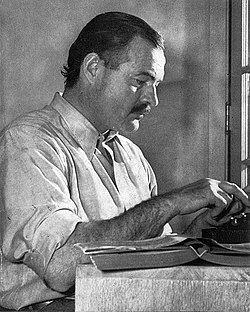Ernest Hemingway Quote
I knelt and started to pray and prayed for everybody I thought of, Brett and Mike and Bill and Robert Cohn and myself, and all the bull-fighters, separately for the ones I liked, and lumping all the rest, then I prayed for myself again, and while I was praying for myself I found I was getting sleepy, so I prayed that the bullfights would be good, and that it would be a fine fiesta, and that we would get some fishing. I wondered if there was anything else I might pray for, and I thought I would like to have some money, so I prayed that I would make a lot of money, and then I started to think how I would make it, and thinking of making money reminded me of the count, and I started wondering about where he was, and regretting I hadn’t seen him since that night in Montmartre, and about something funny Brett told me about him, and as all the time I was kneeling with my forehead on the wood in front of me, and was thinking of myself as praying, I was a little ashamed, and regretted that I was such a rotten Catholic, but realized there was nothing I could do about it, at least for a while, and maybe never, but that anyway it was a grand religion, and I only wished I felt religious and maybe I would the next time; and then I was out in the hot sun on the steps of the cathedral, and the forefingers and the thumb of my right hand were still damp, and I felt them dry in the sun. The sunlight was hot and hard, and I crossed over beside some buildings, and walked back along side-streets to the hotel.
I knelt and started to pray and prayed for everybody I thought of, Brett and Mike and Bill and Robert Cohn and myself, and all the bull-fighters, separately for the ones I liked, and lumping all the rest, then I prayed for myself again, and while I was praying for myself I found I was getting sleepy, so I prayed that the bullfights would be good, and that it would be a fine fiesta, and that we would get some fishing. I wondered if there was anything else I might pray for, and I thought I would like to have some money, so I prayed that I would make a lot of money, and then I started to think how I would make it, and thinking of making money reminded me of the count, and I started wondering about where he was, and regretting I hadn’t seen him since that night in Montmartre, and about something funny Brett told me about him, and as all the time I was kneeling with my forehead on the wood in front of me, and was thinking of myself as praying, I was a little ashamed, and regretted that I was such a rotten Catholic, but realized there was nothing I could do about it, at least for a while, and maybe never, but that anyway it was a grand religion, and I only wished I felt religious and maybe I would the next time; and then I was out in the hot sun on the steps of the cathedral, and the forefingers and the thumb of my right hand were still damp, and I felt them dry in the sun. The sunlight was hot and hard, and I crossed over beside some buildings, and walked back along side-streets to the hotel.
Related Quotes
The downfall of the attempts of governments and leaders to unite mankind is found in this- in the wrong message that we should see everyone as the same. This is the root of the failure of harmony. Bec...
About Ernest Hemingway
Hemingway was raised in Oak Park, Illinois, a suburb of Chicago. After high school, he spent six months as a reporter for The Kansas City Star before enlisting in the Red Cross. He served as an ambulance driver on the Italian Front in World War I and was seriously wounded by shrapnel in 1918. In 1921, Hemingway moved to Paris, where he worked as a foreign correspondent for the Toronto Star and was influenced by the modernist writers and artists of the "Lost Generation" expatriate community. His debut novel, The Sun Also Rises, was published in 1926. In 1928, Hemingway returned to the U.S., where he settled in Key West, Florida. His experiences during the war supplied material for his 1929 novel A Farewell to Arms.
In 1937, Hemingway went to Spain to cover the Spanish Civil War, which formed the basis for his 1940 novel For Whom the Bell Tolls, written in Havana, Cuba. During World War II, Hemingway was present with Allied troops as a journalist at the Normandy landings and the liberation of Paris. In 1952, his novel The Old Man and the Sea was published to considerable acclaim, and won the Pulitzer Prize for Fiction. On a 1954 trip to Africa, Hemingway was seriously injured in two successive plane crashes, leaving him in pain and ill health for much of the rest of his life. He committed suicide at his house in Ketchum, Idaho, in 1961.
